- Home
- Andrew McGahan
1988 Page 8
1988 Read online
Page 8
We kept looking up. How high they were?
‘For the height, we divide them into three levels. Low, middle and high. Low level is anything below eight or nine thousand feet. Middle is nine thousand up to twenty thousand feet. High is twenty thousand feet and upwards.’
I said, ‘How do you tell?’
‘Practice is the best thing. Knowing the type of cloud helps too.’ He opened another manual. There were several pages of colour photographs of clouds, each photo accompanied by a name. ‘All you really have to do is match what you see to one of the pictures, and you’ve got the name.’
We tried it out. Sure enough, the big fluffy ones were cumulonimbus. Code name Cb. Cb3 for smaller ones, Cb9 for the massive storm types. We selected Cb3. It seemed simple enough.
‘See,’ said Lawrence, ‘It says here that Cb3 is almost always low level. And looking at them you can tell they’re low level. I’d say about five or six thousand feet. And there are certain types of cloud that are usually mid level, and high level too. You’ll get to know them. See that sheet of thin cloud, way up beyond the Cb3? That’s clearly high-level cirrus. A little wispy, so it’s this type. Ci4, not Ci1 or Ci2. You can tell it’s high because you can’t see it moving, like the Cb3s are. Too far away. But you have to watch the middle-level stuff. Ac5 can look just like Ci2. Cs5 is a dead ringer for As1 and even Cs9. And something like St6 can fuck you right up. Height is everything. You see what I mean?’
He was pointing at dozens of different pictures. They all looked the same. Wayne and I exchanged a glance. We had no idea what he meant. We nodded.
‘Fine. The next thing is direction. Work out where north is, then line the clouds up against something tall and still—like a light pole—and watch.’
We did so. The Cb3s were coming, we decided, from the north-east. The Ci2, no matter how long we watched, didn’t seem to be moving at all.
‘Go with gut instinct,’ Lawrence said, ‘Don’t stare for hours, just take a quick glance up and go with whatever direction comes to mind. You’ll always be right. The human eye can do amazing things if the brain isn’t overruling it.’
He was gazing up keenly, waiting. A weather evangelist. Wayne and I threw our human eyes skywards and went with our gut instincts. Mine said south-west. Wayne’s said south-west. We turned to Lawrence.
He blinked. ‘Well, you’ll get it eventually. The last thing is to decide how much cloud of each level there is in the sky. We divide the sky into eighths. The Cb3 for instance is taking about half the sky maybe, so that’s four-eighths. The stratus seems to be almost over the whole sky, so we’ll say seven-eighths. Okay?’
My mind was going numb.
‘How are we supposed to do this at night?’
‘If there’s a moon it’s quite easy. One thing though, at night the thin, high level stratus can be almost invisible. You have to look for things like blurred stars, or rings around the moon.’
The explanations went on. I was barely listening. They were only clouds. At one point, four grey military jets screamed down the runway next to us and blasted skywards. There were more taxiing about in the distance. It appeared that this part of the airport was an RAAF base. Lawrence peered after the jets as they vanished in the clouds.
‘F-111s,’ he said. ‘You’ll get to know those fuckers pretty well, believe me.’
‘Why?’
‘You’ll see.’
Then it was back inside the shack again. We sat down at a desk, and Lawrence showed us a decoding sheet. All the figures we’d written in the journal now had to be coded. There were also calculations to be made, using the air pressure, and various thermometer readings. In the end we had a list of letters and numbers, about thirty digits long. ‘This is what you read over the radio,’ Lawrence said, ‘And back here we punch it straight into the computer. Then at the end of each month you send in the field-book, so we have a written record as well. And that’s all there is to it.’
It wasn’t though.
We went through the entire observation and recording process again. Wayne and I were doing it on our own this time, Lawrence looking on. Wayne had trouble. He wrote in the wrong columns, read the instruments back to front, took the maximum wind gust for the average. Together we took almost forty minutes to reach the encoded list. The clouds were our biggest problem. They’d changed since our last look. We stumbled around, glancing up quickly, going for the gut reaction. Height. Type. Eighths. Direction. It was hopeless.
Lawrence did his best to remain calm. He took us off for lunch at a takeaway near the airport. ‘We’ll have one more run this afternoon, then I’ll have done all I can. But practise it, huh. Please.’
‘We will.’
‘I’ll also have to get your names and bank accounts. Pay is monthly. We add up all the observations you’ve done and work out what you’re owed. It’s a sliding scale. The night observations are worth more than the day ones, for obvious reasons.’
He went on with various details, then it was back to the airport. The afternoon test run was a huge success, just under half an hour. It was three o’clock by that stage. Lawrence ushered us into one of the computer rooms. A man was sitting at a keyboard, listening to a speaker and typing in what he heard. There were distant, crackly voices coming over the speaker, reading out letters and numbers.
‘That’s the three o’clock ‘sked’—scheduled call,’ said Lawrence, ‘We’ve got about a dozen weather stations out there, and they all report in at the same intervals. Listen.’
We listened. Voices came and went, some male, some female. It was a faraway and desolate sound.
‘One of those, of course,’ said Lawrence, ‘Is Cape Don.’
We walked out to the car. We were now fully trained and accredited Weather Observation Officers. As titles went it was the biggest I’d ever had. Lawrence came out with us. He’d grown a little strained towards the end of the day, now he seemed quite cheerful. ‘Seen much of Darwin yet?’
‘We only got in yesterday. We spent last night at a pub in the mall. The Victoria.’
‘Ah, the Vic. Used to be a good one, but it’s a bit of a tourist trap now. If you stick around you’ll find better ones. When are you leaving?’
‘Tomorrow.’
‘Maybe when you get back then. Believe me, Darwin grows on you. In the meantime, if you have any problems over there, just radio in.’
‘Thanks.’
‘You’ll have fun. Cape Don is a beautiful place. We get over there ourselves sometimes, to do maintenance on the station. Great fishing. Which house are they putting you in?’
‘We don’t know yet.’
He laughed. ‘I can guess. Take some cleaning gear. But seriously, make sure you do the weather properly over there. Don’t miss any observations, and fill out everything in the field-book. Cape Don’s been a real pain for us lately. The last few people they’ve had out there have been useless. To tell the truth, we didn’t want you two for this job. We had our own people lined up. I hear Allan Price did too. You know who he is? The old Aboriginal spokesman?’
I said that we did.
‘You might find you aren’t all that welcome,’ he smiled, ‘When you get over there.’
ELEVEN
Wednesday, our last few hours in Darwin. We’d done nothing with the previous night. Just sat in the room, reading, staring at the walls. We were committed now, and we were tense.
In the morning I picked up my new cheque book from the bank. Then we found our way to the Nightcliff supermarket. We were sent to the office, where we mentioned the name of the Conservation Commission and were thus granted an account. Then it was time to shop. We pushed the trolley up and down, wondering what to take to the lighthouse. Insect repellent was one certainty, four bottles, tropical strength.
Food was another. Steaks, mince, pasta, vegetables, bread, sauces, herbs and so on. Enough for ten days. The way we figured it, we wouldn’t be ordering any more food in until the following Friday. Then there were the toiletries, som
e first aid gear, batteries, cleaning liquids. Everywhere we looked there seemed to be something we’d need. The trolley filled. We found some cheap wind-up alarm clocks, took two of them. We bought envelopes, steel wool, painkillers. A carton of Winfield Blues for Wayne. Then we were in the alcohol section. We looked at all the cartons of beer, the bottles of spirits.
‘Can we even take alcohol?’ I said, ‘Some of these Aboriginal places are supposed to be dry.’
‘No one told us we couldn’t.’
We loaded a second trolley. Two cartons of Fourex cans. A bottle of bourbon. A four-litre cask of claret. It didn’t seem so much, when we considered those ten days. We added another carton. Then we pushed both the trolleys down to the checkout and watched while the stuff was tallied up. It came to over two hundred and seventy dollars.
‘On credit,’ I said, and explained who we were. The staff seemed used to it. We waited while they packed it all in boxes and then wrapped the boxes in tape to survive the flight. We carted the stuff out and jammed it in the car. Even the front seat was full by now. We contemplated it all. For a couple of vagabond, wandering souls, we had an enormous amount of essential equipment. We squeezed ourselves in and drove to the airport.
The Northwing terminal was a small shed in a large car park. There was an office in the shed and a woman behind the desk. We told her who we were and she checked a timetable, then told us the plane would be along any minute.
I said, ‘Is there any problem with me leaving my car in the car park for the next six months?’
‘Six months! Won’t your battery go flat?’
‘I guess so. I don’t see how I can avoid it.’
She thought. ‘You could leave the keys here if you want. I could drive it home every once in a while. Keep the battery charged.’
‘That’s very nice of you.’
‘Well, actually, it’d be handy for me too sometimes. My husband and I share the one car.’
I gave her the keys. We went outside to wait.
‘Are you crazy,’ Wayne said, ‘Giving her your car?’
‘She had an honest face. Besides, she won’t treat it any worse than I would.’
Still, I was surprised at myself. I didn’t even like loaning the car to friends, yet alone strangers. Maybe it was the Darwin air, or the sense of occasion. It didn’t seem the time or the place to be suspicious of people. We were jumping off into the unknown and who knew when or if we’d be back.
I looked out over the tarmac. There were plenty of planes parked there, big and small. Presently one taxied our way. It was a little single-engine Cessna, blue and white, with the word Northwing painted on the nose. It looked old. I’d been hoping for a twin-engine. I’d never flown before, and two sounded more encouraging than one, as far as engines went.
The plane pulled up and the pilot climbed out. He wore mirrored sunglasses.
‘Cape Don?’ he said to us.
‘Uh-huh.’
‘Where’s your stuff?’
I cocked my thumb towards the car.
He looked. ‘Jesus Christ.’
We looked too. It was ludicrous.
‘Maybe you should get a bigger plane,’ Wayne suggested.
The pilot wasn’t amused. ‘Whatever doesn’t fit, doesn’t go.’
We unloaded the car, carrying each box or item over to the pilot. He stacked them in the various compartments. The plane turned out to be a four-seater and there was a surprising amount of space. Our things disappeared. Finally all that was left were four large boxes and Wayne’s two easels. There was nowhere to put them. The pilot dove in and after some grunting and heaving, pulled one of the rear seats out. He dumped it on the ground. The boxes and the easels took its place.
‘How long you guys staying over there?’
‘Six months.’
He looked at his plane. ‘Might just be long enough to get all this unpacked. Well, hop on in.’
Hop on in. Looking at it, all laden down, the Cessna and it’s single engine looked tiny. The single engine in particular. But then again a single engine could pull a semitrailer, a boat, even a train. What was three people and half a ton of artistic lifestyle in comparison?
I looked at Wayne. ‘You flown before?’
‘Sure.’
‘Then I’m taking the front seat.’
He shrugged, nodded.
We got in. The pilot showed us how to buckle-up. Then he talked on the radio briefly and we were moving. Across the tarmac, around some corners, then onto the runway. I looked along the strip. I thought about landings and take-offs—the danger times, when all the deaths occurred. I wondered if this was fear. Was I going to be afraid of flying? Maybe it was like seasickness, you could never know until it happened to you. I’d never been to sea either.
The pilot upped the revs, then released the brakes. We moved down the runway, picking up speed. I watched the dashboard. Nothing went red. Then suddenly the nose pointed up and we were airborne. I experienced a moment of total terror. I laughed, cut it off abruptly. The fear faded. I looked out the window. So this was flying.
We were climbing steeply. The runway vanished and we were over the swamps that bordered the airport. Then it was houses. People mowing the back lawns. Some goats in a paddock. Then it was the ocean, shimmering and blue. I was impressed, and a little unsure. I’d always imagined that planes carved their way through the air as steadily as a car on the road. I hadn’t expected the light, skittish sensation. The way the little craft bounced and slid about in the air.
We kept climbing. The ocean unrolled below us, points of land jutting out. I turned and looked at Wayne. He was gazing out with his usual indifference. Whatever was going to crack it, it wasn’t flying. I turned forward again. We were nearly up to the clouds now. They were small, white and fluffy. Cumulus no doubt, Cu2.
We levelled off just above them. I checked the altimeter. It said five thousand feet. I took note of that for future reference. I was a Weather Observation Officer now, and if these clouds were at five thousand feet today, chances were they always would be.
Time passed. Twenty minutes. Forty. The novelty of flight wore off. I searched the ocean below for ships. Nothing. I became bored. I watched the pilot. He looked maybe fifty. Worn. Also bored.
I raised my voice above the engine. ‘You done this trip before?’
The mirrored sunglasses glanced my way. ‘Often enough.’
‘So what’s Cape Don like?’
He thought. ‘Got a good airstrip.’
I nodded. It was a pilot’s perspective on life.
He looked at me again. ‘You don’t know a thing about it, do you?’
‘No.’
‘I’ll say this then. I don’t fly many people in to Cape Don, but I seem to fly a lot out.’
I thought about that. Thought of nothing else to say.
More time passed. Eventually, I could see the coastline of a large island down to our left. On our right the mainland had appeared again. It curved out in a point towards the island, leaving a wide channel in between. Finally the pilot leaned over. ‘That’s Melville Island on the left. And to the right . . . can you see it?’
I squinted. The mainland appeared heavily forested. Near the tip of the point there was a small, upright sliver amidst the trees. We were headed directly for it, and losing height. The lighthouse. Eight days since Brisbane and there it was. It wasn’t what I was expecting. It wasn’t white. It was brown. Thin as a spike. Nor was it set on the coast, on some high, rocky point. There was no high, rocky point. The land seemed low and unbroken, and there was no beach, only mangroves. The lighthouse itself was positioned well back from the water, in a small, bare clearing.
The plane banked and we circled the area. I stared down. I saw houses, their roofs of silver corrugated iron. Sheds and paths. A four-wheel drive. A human figure emerged from one of the houses, and looked up. Then we levelled off and headed inland. The bush widened out, stretched to the horizons. There were no other houses or roads or fences
or anything in sight. Nothing but a red slash of bare earth up ahead. The airstrip.
The pilot got us in line. It seemed a short, scraggy space. I tensed. The trees rose, very fast. It was worse than taking off. We dipped suddenly, hit the dirt, bounced, hit again, and then we were on the ground. I relaxed. We slowed and swung round, taxied back through the dust. There was a track there, leading off into the bush. We stopped near it. The pilot checked various things on the dash, then killed the engine. Silence fell.
‘Well boys,’ he said, ‘Here you are.’
TWELVE
We climbed out. I walked away from the plane. The air was hot, humid and still. A windsock hung limply on its pole. Otherwise there was nothing to see but the bush lining the strip. Tall eucalypts, leaves of drab green and red. A crow called in the distance, stopped. Cape Don, the Cobourg Peninsula.
I looked around. Wayne was staring off, smoking a cigarette. The pilot was already unloading our gear. ‘The ranger should be here in a minute or two,’ he said. ‘That loop I did around the lighthouse, it was to let him know we were about to land.’
We helped with the unloading. After a time I could hear the sound of a car engine. A Toyota four-wheel drive emerged from the little track and parked itself next to the plane. A man got out, removed a cigarette from his mouth, looked at us.
‘G’day,’ he said.
He was maybe forty or fifty years old. He didn’t look like a ranger. He was wearing a ranger shirt, but it was ragged, faded almost to white. A round belly showed through the buttons, hung over the rim of his shorts. He had long wispy hair, and was wearing thongs.
‘G’day,’ I replied.
‘So which one is the artist?’
‘I am,’ said Wayne.
The ranger offered his hand. ‘Vince.’
‘I’m Wayne. And that’s Gordon.’
Vince looked at me. ‘I was told they were sending me an artist and his French girlfriend. You’re no French girlfriend.’
I said, ‘Pardon moi.’
The stare continued. ‘Must’ve been someone’s idea of a joke.’ He turned to the pilot. ‘Any mail?’

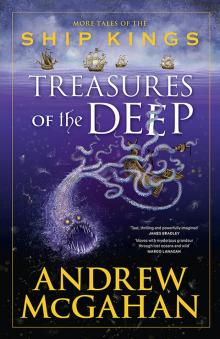 Treasures of the Deep
Treasures of the Deep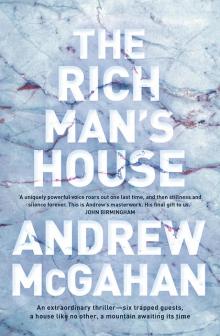 The Rich Man’s House
The Rich Man’s House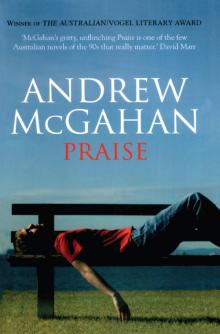 Praise
Praise The White Earth
The White Earth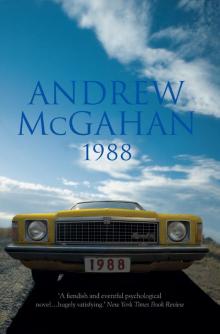 1988
1988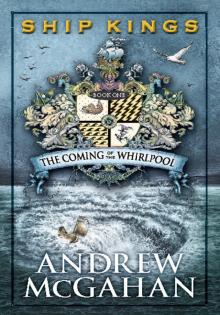 The Coming of the Whirlpool
The Coming of the Whirlpool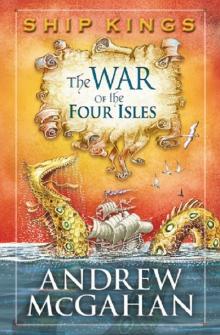 The War of the Four Isles
The War of the Four Isles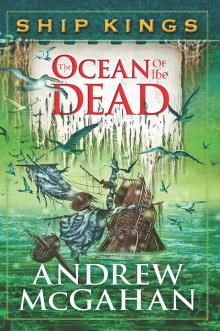 The Ocean of the Dead: Ship Kings 4
The Ocean of the Dead: Ship Kings 4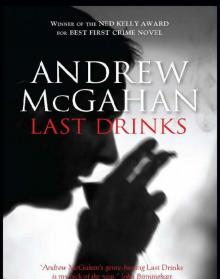 Last Drinks
Last Drinks Wonders of a Godless World
Wonders of a Godless World Underground
Underground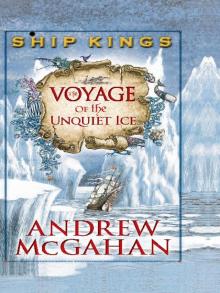 The Voyage of the Unquiet Ice
The Voyage of the Unquiet Ice